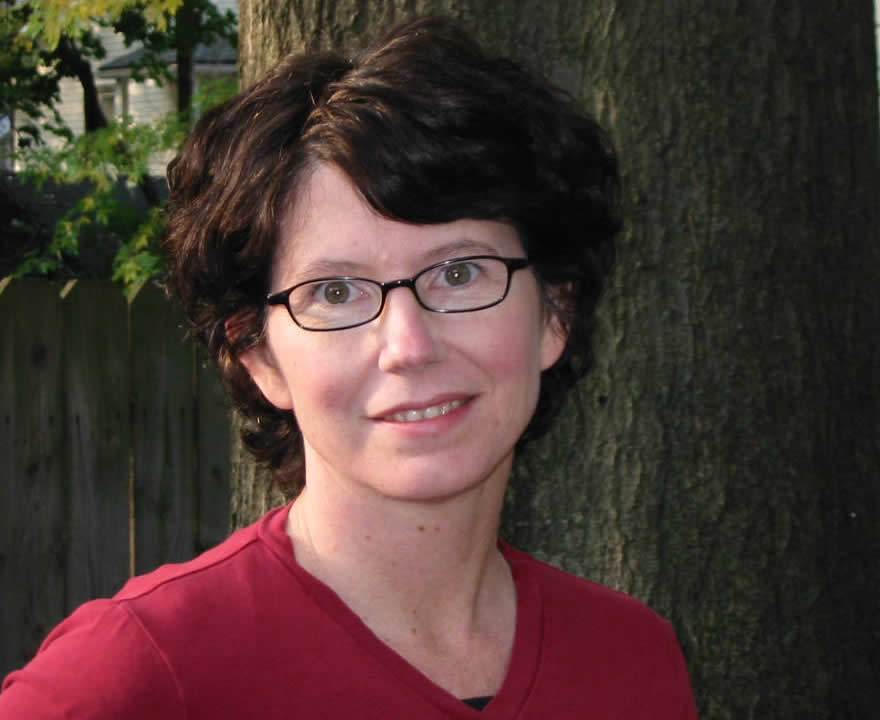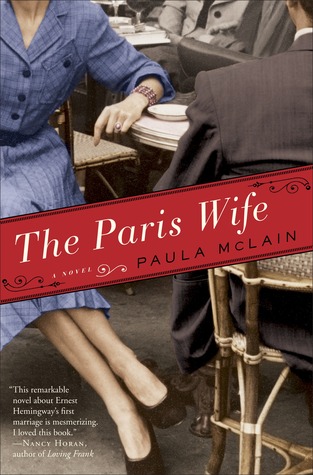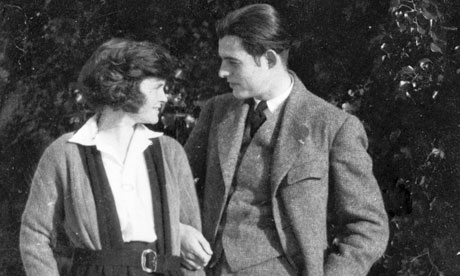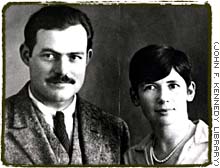 In
her latest book, The Paris Wife (Ballantine, $25, 9780345521309,
February 22, 2011), a
novel based on Ernest Hemingway's first marriage to Hadley Richardson, Paula McLain
vividly recounts a time, a place and a group of people. McLain
received an MFA in poetry from the University of Michigan and has been awarded
fellowships from Yaddo, the MacDowell Colony and the National Endowment for the
Arts. She is the author of two poetry collections as well as a memoir, Like
Family: Growing Up in Other People's Houses,
and a novel, A Ticket to Ride. She lives with her family in Cleveland.
In
her latest book, The Paris Wife (Ballantine, $25, 9780345521309,
February 22, 2011), a
novel based on Ernest Hemingway's first marriage to Hadley Richardson, Paula McLain
vividly recounts a time, a place and a group of people. McLain
received an MFA in poetry from the University of Michigan and has been awarded
fellowships from Yaddo, the MacDowell Colony and the National Endowment for the
Arts. She is the author of two poetry collections as well as a memoir, Like
Family: Growing Up in Other People's Houses,
and a novel, A Ticket to Ride. She lives with her family in Cleveland.
 What
drew you to this subject?
What
drew you to this subject?
I had never written a historical novel, but nothing else I was considering at the time felt quite right. Then it occurred to me to set a book in the '20s with a writer as the main character. I considered Fitzgerald, but had recently read A Moveable Feast, which brought Hemingway to mind. I recalled that he had rendered Hadley in such a tender manner and with a definite tinge of regret for the way that relationship ended. So, in a flash I decided to tell the story of Hemingway's first marriage. I went straight to the library and brought home a pile of biographies. They all convinced me that this was the right book at the right time. Much has been written about Martha Gellhorn because of her career, but not a great deal is known about Hadley.
Did you have preconceived ideas about Hemingway or Hadley?
I knew nothing about Hadley but had all the ordinary ideas about Hemingway: his gnarly persona, egomania, alcoholism, temperamental nature--so I was predisposed against him. This would be a feminist book, one in which I could dish the dirt on Hem. The big surprise was how much sympathy I felt for him as I learned more about his background, his family life, his war injury, his troubled relationship with his mother. He was melancholic, shell-shocked, traumatized, afraid of the dark, afraid of pain, a hypochondriac--which made him a really terrible, sick person, and superstitious and puritanical about sex. He really did believe that if you slept with a woman, you should probably marry her. Nothing like the conventional wisdom about Ernest Hemingway, the swaggering picture of male indomitability.
 How
did Hadley manage to land him? He was drop-dead gorgeous, great fun at a party,
a devil-may-care journalist ready to accept any assignment, quite comfortable
in his world.
How
did Hadley manage to land him? He was drop-dead gorgeous, great fun at a party,
a devil-may-care journalist ready to accept any assignment, quite comfortable
in his world.
Hadley was pretty but not beautiful, 29 to his 21. I think what attracted Hemingway was her warmth and her solidity, her generous heart. She was also smart and very funny, as her letters show. He thought that she was incredibly talented at the piano, an artist in her own right. They found an easy rapport right away. Their backgrounds were similar: domineering mothers, alcoholic fathers, both of whom killed themselves. They fell for each other very quickly. When Hadley left Chicago, the letters went back and forth fast and furiously. Hemingway proposed in a letter, Hadley said "yes" and that was that.
Did Hemingway's relationship with his mother color all future relationships with women, or is that too easy?
Biographers have said that Hemingway's mother did have a mighty influence on his subsequent relationships, but I think that there was real love and tenderness between them, seen in their letters. He always needed his parents' approval and was devastated when he sent them his first book, In Our Time, and his father returned it saying that it was disgusting and profane and that he need not send any more of his writing until he regained his moral center. He was always drawn to the working class, to a raw, peasant quality found in people not of his parents' class. There was mutual trust between Hemingway and Hadley, very important to him.
Speaking of which, was it Hadley's loss of his manuscripts that pushed him into the infidelity that finally caused the marriage to founder?
He said that he forgave her, but there was a wedge driven between them because he couldn't imagine how she could have put them under a train seat and left the compartment. How could she really understand the importance of his work if she could do that? Later, he gamely said that it was probably a good thing because it forced him to start over, but neither of them really believed that. What was his work really worth in her eyes? He was meticulous about keeping everything--lists, even Hadley's monthly cycle, scraps of paper--and she lost all his work. Was she careless, disloyal, trying to sabotage him, as some have opined? I think it was an honest mistake with fearsome consequences.
Her unexpected pregnancy was another wedge. They had agreed not to have a baby yet, and here she was, pregnant. Another honest mistake? We will never know, but it did make life more difficult. The life they lived in Paris was definitely hampered by having a baby along. She was older, hearing that clock ticking, and now wanted a baby; Ernest didn't.
What is the upside and downside of writing about real people?
The great thing about it is that if you find the right story, it has its own trajectory. You just hang on, take them on their own terms and let them tell their own stories. This one had it all: exotic travel, such an interesting collection of people in Paris in the '20s, a very romantic story. On the downside, it was easy to be overwhelmed by Hemingway's life being so well documented. Get no detail wrong, check everything over and over again--or it will be noticed.
So much of the story is Paris, writ large. Did you go on a field trip to get it right?
Oh yes! I went to Paris and Pamplona and San Sebastian and Antibes. So much is the same as when they lived there. I stood in the same place they did to watch the running of the bulls, had coffee in the same cafes, saw their first apartment. We are always tearing things down to "improve" them; it was a real treat to see things preserved.
The circumstances of the marriage failing are almost too hard to believe. For a straight, loyal woman like Hadley to live in a ménage à trois boggles the mind.
 Pauline
Pfeiffer was very different from Hadley. She pretended to be Hadley's best
friend to seduce Ernest. Their peculiar arrangement, with Pauline standing by
as mistress and Hadley still Hemingway's wife, is true to historical record. Hadley
was so much in love with Ernest that she would do anything to hang on to him. How
could she stay in the marriage in these circumstances as long as she did? Her
passivity was no doubt a combination of depression and denial. They had made it
through oceans of sexual license going on all around them; Pauline remained
true to her vows and her intentions, until it was simply no longer possible. The
story of Hadley Richardson and Ernest Hemingway is very moving, poignant, happy
and sad. The truth is that sometimes we fail each other.
Pauline
Pfeiffer was very different from Hadley. She pretended to be Hadley's best
friend to seduce Ernest. Their peculiar arrangement, with Pauline standing by
as mistress and Hadley still Hemingway's wife, is true to historical record. Hadley
was so much in love with Ernest that she would do anything to hang on to him. How
could she stay in the marriage in these circumstances as long as she did? Her
passivity was no doubt a combination of depression and denial. They had made it
through oceans of sexual license going on all around them; Pauline remained
true to her vows and her intentions, until it was simply no longer possible. The
story of Hadley Richardson and Ernest Hemingway is very moving, poignant, happy
and sad. The truth is that sometimes we fail each other.
You've written poetry, a memoir, a different kind of novel and now a historical novel. Do you find one genre more congenial than another?
I don't really have to choose. Another historical novel seems to fit my personality. It is challenging in really delightful ways, a good history lesson, and there is mimicry involved in getting the voice right. It is also time travel in the best sense.--Valerie Ryan

